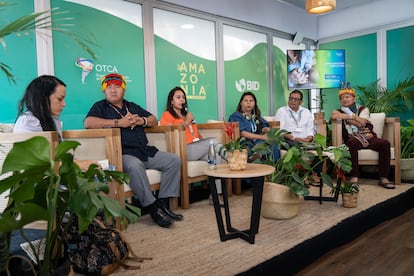Indigenous peoples call for direct funding to protect nature at COP16 on biodiversity
Amazonian organizations and the Inter-American Development Bank announce the first projects of the Amazon for Life fund in Cali


Indigenous peoples are guardians of nature, the greatest allies for its protection, and the demands of Amazonian communities to obtain direct access to financing have resonated at COP16 in Cali. As has already occurred in other international forums, at the world summit on biodiversity Indigenous organizations have demanded not only that their voice be heard, but also that their contributions be taken into account and that they form an essential part of the decision-making process. In particular, that resources directly reach the communities that are on the front line of efforts to confront climate change and biodiversity loss. “Indigenous people take care of more forests, more territories, and we are the ones who receive the least,” states José Esach, president of the Confederation of Indigenous Nationalities of the Ecuadorian Amazon (CONFENIAE).
The financing debate is one of the most sensitive, both in biodiversity and climate change negotiations. The mechanisms tend to be cumbersome and bureaucratic, say representatives of some organizations, who ask for greater flexibility. “Very little reaches the territories,” lamented Tabea Cacique, a member of the Asháninka people of the Interethnic Association for the Development of the Peruvian Rainforest (AIDESEP), in one of several talks on the subject. “Do not look at us as Indigenous peoples who cannot manage the funds; teach us,” was her call. International funding dedicated to Indigenous peoples is usually channeled through intermediary organizations, with a low rate of knowledge transfer to the beneficiary communities.
The Amazon stands out at this summit due to it enormous importance. Among other things, the Amazonian river system contains almost 20% of the planet’s fresh water. Indigenous organizations in the Amazon basin represent more than 500 peoples and have been calling for a global agreement for the permanent protection and conservation of 80% of the Amazon by 2025, as an urgent measure to avoid the imminent point of no return and a planetary crisis, according to the diagnosis of a direct financing model presented by several Indigenous organizations from Ecuador, Colombia, Brazil, and Peru, with the support of WWF within the framework of COP16.
Indigenous peoples and their knowledge systems have proven to be highly effective in caring for and conserving Amazonian ecosystems, the organizations claim, and having direct access to resources would substantially strengthen their initiatives. However, less than 1% of international climate aid is allocated to Indigenous peoples’ land tenure and forest management. Among the barriers identified by their organizations are a lack of understanding of the rights of Indigenous groups, and their contribution to biodiversity conservation and tackling the climate crisis.
Among the initiatives taking place in Cali, the Amazon for Life Fund stands out, an umbrella program of the Inter-American Development Bank (IDB) that seeks to protect biodiversity and accelerate sustainable development. To achieve this, it proposes expanding financing, promoting the exchange of knowledge, and facilitating regional coordination among the eight Amazonian countries. Peru’s Aidesep is the first Indigenous organization to have a project approved by the IDB as part of the Amazon for Life fund, with which it will improve the capacities in management of bio-enterprises and the quality of production of 25 Indigenous companies in nine Amazonian regions. Two other projects are being prepared with the organization ORPIA, which represents communities in Venezuela, and with CONFENIAE in Ecuador.
The Amazon for Life Fund is the result of an alliance with the Coordinator of Indigenous Organizations of the Amazon Basin (COICA) and channels resources to Indigenous organizations. With a budget of $10 million, it is the first of its kind created to directly support such projects, offering financial and technical support.
It is a unique, pioneering opportunity, says Fanny Kuiru of COICA. “We as Indigenous peoples hold great hope that this will be the direct financial mechanism for Indigenous peoples and communities, and that has been our struggle, that the financing reaches where the real conservation work is,” Kuiru said during the announcement in the so-called blue zone at the Cali summit. Cooperation must be flexible, she stressed. “We are working on the governance mechanism for this fund. It is not just about handing out the money,” she added, referring to the importance of traceability and monitoring. “Expectations are quite high, because Indigenous peoples are strongly impacted by climate change,” concurred Jorge Pérez, president of AIDESEP. “Now we have to comply, implement, be accountable,” added José Gregorio Díaz Mirabal of ORPIA.
“We have a lot to learn from Indigenous peoples,” said Ilan Goldfajn, president of the IDB. “Their territories are among the best preserved in the Amazon. It is important to create conditions for them to be autonomous and to be able to carry out their projects and retain the knowledge generated from these experiences for their future generations.”
Tatiana Schor, head of the IDB’s Amazon Unit, explains that the fund is highly innovative for several reasons. She explains how COICA and its organizations began a direct conversation with the bank in which they prepared to create it jointly. “That process was important for COICA, which had to organize and structure itself, and for us at the IDB as well; we learned a lot.” The method of governance, of working on investments in Indigenous economies, is tailor-made. “The fund is changing the way the entire financial ecosystem is beginning to view Indigenous organizations,” adds Schor. The idea is that it will be a fund that remains in the hands of COICA, which is the largest regional organization in the world and brings together different national organizations, so that other donors can join and begin the work of direct financing.
“This is one of the paths that we, the peoples and nationalities of Latin America, must follow. Donors, multilateral organizations and governments should work along these lines,” said Esach in celebrating the announcement. “We take care of the jungle; we are part of the jungle.”
Sign up for our weekly newsletter to get more English-language news coverage from EL PAÍS USA Edition
Tu suscripción se está usando en otro dispositivo
¿Quieres añadir otro usuario a tu suscripción?
Si continúas leyendo en este dispositivo, no se podrá leer en el otro.
FlechaTu suscripción se está usando en otro dispositivo y solo puedes acceder a EL PAÍS desde un dispositivo a la vez.
Si quieres compartir tu cuenta, cambia tu suscripción a la modalidad Premium, así podrás añadir otro usuario. Cada uno accederá con su propia cuenta de email, lo que os permitirá personalizar vuestra experiencia en EL PAÍS.
¿Tienes una suscripción de empresa? Accede aquí para contratar más cuentas.
En el caso de no saber quién está usando tu cuenta, te recomendamos cambiar tu contraseña aquí.
Si decides continuar compartiendo tu cuenta, este mensaje se mostrará en tu dispositivo y en el de la otra persona que está usando tu cuenta de forma indefinida, afectando a tu experiencia de lectura. Puedes consultar aquí los términos y condiciones de la suscripción digital.








































